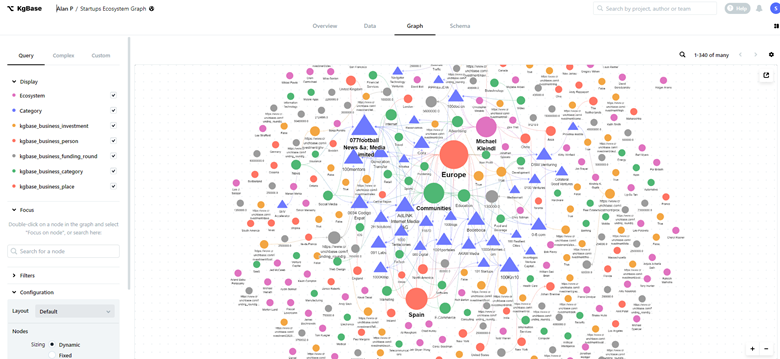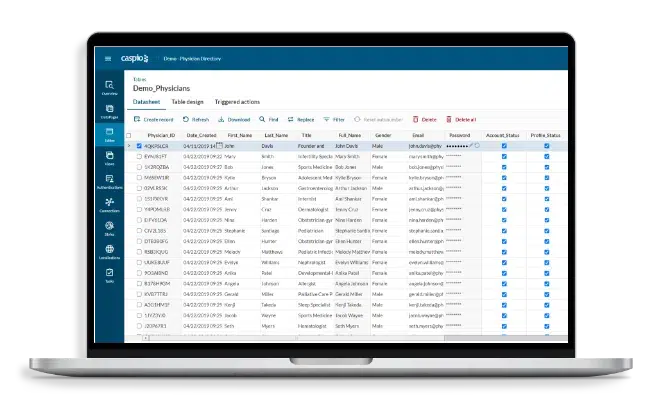Exploring the Benefits of Scalable Databases That Need No Coding Skills for Efficient Data Monitoring Solutions
The emergence of scalable databases that remove the need for coding abilities presents a transformative chance for organizations looking for effective information administration solutions. As we think about the effects of such improvements, it ends up being crucial to analyze exactly how they can reshape the landscape of data management and drive lasting growth in an affordable environment.
Improved Access for Users
Improved availability for customers is a crucial facet of scalable databases, making certain that information management systems are straightforward and instinctive. In a period where data-driven decisions are vital, availability permits a larger variety of users, consisting of those without comprehensive technological know-how, to involve with database systems efficiently. This democratization of information access facilitates boosted collaboration across departments, empowering staff members to make and draw out insights informed choices.
Straightforward interfaces, such as aesthetic information and drag-and-drop attributes representation, simplify intricate data communications. These improvements minimize the discovering contour connected with standard data source management, allowing customers to concentrate on leveraging data instead of coming to grips with technical complexities. Scalable databases usually integrate real-time analytics and personalized dashboards, offering individuals with instant understandings tailored to their certain requirements.

Cost-Effectiveness and Source Financial Savings
Reliable information administration not just hinges on accessibility however also on cost-effectiveness and resource cost savings. Scalable databases made for customers with no coding skills dramatically lower monetary concerns typically connected with conventional data source monitoring systems. By getting rid of the requirement for specialized shows competence, companies can allocate their resources much more successfully, focusing funds on core company tasks as opposed to substantial training or hiring knowledgeable employees.
Additionally, these databases typically make use of cloud-based remedies, which even more reduce prices associated with hardware and upkeep. Organizations can scale their database services according to their demands, preventing the expenditures incurred from over-provisioning sources. This versatility suggests organizations can adapt to transforming demands without sustaining unnecessary expenses, bring about substantial lasting cost savings.
Additionally, easy to use interfaces simplify information entry and administration procedures, decreasing the moment invested in administrative jobs. This effectiveness translates right into labor expense financial savings, allowing teams to concentrate on critical initiatives instead of routine maintenance. In general, embracing scalable databases that need no coding abilities cultivates a much more cost-efficient method to data management, making it possible for companies to maximize their resources while keeping high levels of functional efficiency.
Improved Partnership Across Teams

Additionally, scalable databases assist in seamless interaction amongst employee. With user-friendly interfaces that require no coding abilities, workers can conveniently develop, modify, and share reports or control panels customized to their details demands. This democratization of data empowers non-technical customers to contribute understandings, boosting the collaborative atmosphere.
In addition, these databases support simultaneous access, allowing numerous users to work on the same dataset at the same time. This function boosts performance, as teams can participate in joint data evaluation without the danger of version control concerns. The capability to leave comments or notes straight within the database better promotes discussion and makes clear data interpretations.
Streamlined Information Monitoring Processes
In today's data-driven setting, companies recognize the need of structured data administration processes to maximize performance and accuracy. By leveraging scalable databases that need no coding abilities, businesses can simplify their data handling and reduce the intricacies usually associated with typical data source systems. This access encourages non-technical users to involve straight with data, helping with quicker decision-making and minimizing reliance on specialized IT workers.
Streamlined data management processes boost process by automating routine tasks such as information entrance, validation, and reporting. Automated data informative post integration ensures that details from different resources is aggregated flawlessly, getting rid of silos and promoting a combined view of important organization metrics (no-code). User-friendly user interfaces allow personnel to manipulate information easily, allowing them to generate insights that drive calculated campaigns without the need for considerable training.
This efficiency not just accelerates functional procedures yet additionally lessens the potential for human error, ensuring that data continues to be trustworthy and precise. Inevitably, streamlined data management procedures through scalable databases result in enhanced productivity, enabling organizations to concentrate on core tasks while guaranteeing that their data management techniques are effective and effective.
Scalability for Growing Businesses

For increasing business, the capability to scale up or down is vital. A scalable data source can handle an influx of data created from new customers, items, or solutions, guaranteeing that organization procedures stay uninterrupted. These databases give the capability to take care of peak lots efficiently, which is necessary during periods of fast development or seasonal spikes.
Additionally, numerous scalable database solutions are designed with straightforward user interfaces that need no coding skills, empowering non-technical team to manage data efficiently (no-code). This democratization of data management permits organizations to allocate sources strategically and lower reliance on specialized IT employees
Ultimately, taking on a scalable database not only enhances operational effectiveness but likewise fosters an atmosphere where businesses can introduce and progress without the constraints of typical data source systems. This adaptability positions companies for lasting success in today's affordable landscape.
Final Thought
In conclusion, scalable data read this sources that require no coding abilities provide significant advantages for effective data management. By streamlining data monitoring processes and offering scalability for growing companies, such options allow companies to adapt to changing demands successfully.
Enhanced accessibility for customers is an essential facet of scalable databases, guaranteeing that data monitoring systems are intuitive and straightforward.Easy to use user interfaces, such as drag-and-drop attributes and visual data depiction, simplify complex data communications. Overall, adopting scalable data sources that need no coding skills cultivates a much more cost-efficient strategy to information management, enabling companies to optimize their resources while preserving high levels of operational efficiency.
By leveraging scalable data sources that require no coding skills, businesses can simplify their data handling and decrease the complexities typically associated with typical database systems - no-code.Streamlined data administration processes enhance workflow by automating routine jobs such as information access, recognition, and reporting